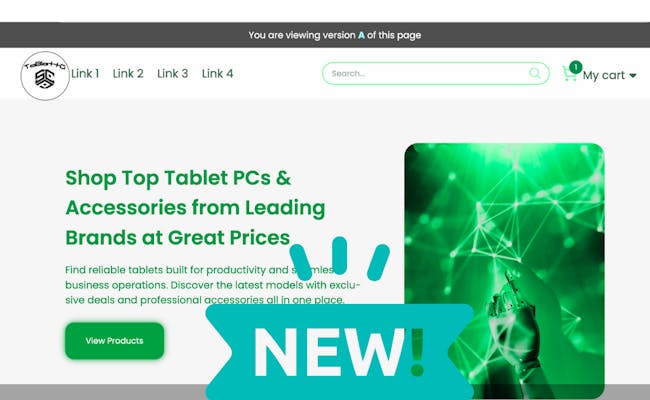Revamped Website Simulation to Launch Mid-August 25
This autumn will see a host of courses use the most modern website analytics simulation experience designed by Simbound

Launch Date: 18 August 2025
Build and monitor realistic looking websites within a simulation-driven course
Now students are able to master website management skills using a modern simulation platform, delivered in the same user-friendly and clear content format you’ve come to expect from Simbound.
Websites have evolved along the years to move beyond a central hub for digital marketing efforts helping serve customers at a multitude of touch-points of their experiences whether this is discovery, usage or post-sale. We are now introducing an updated version of the existing website simulation to address a more sophisticated set of requirements amongst our clients.
Meet the All-new Simbound Website Simulation
Simbound is the initial digital marketing simulation platform built for Education. To date we supported well over 40.000 thousands of students in their transition from education to employment. Our initial website simulation has undergone a major overhaul based on recent user feedback. This latest simulation release covers most of what a modern Content Management System is able to do (and more!).
Website Management Functionality - Main Features

1. No coding knowledge required for content creation and management
2. Intuitive and user-friendly dashboard/interface
3. Easy content creation, editing, and formatting (text, links, images, videos, website blocks)
4. Support for embedded multimedia content (video, audio)
5. Drag-and-drop page builders for layout design
6. Digital asset management (storage, organization of media or page sections for reuse)
7. Collaborative workflows with user-based permissions (students cannot edit pages whilst others are working on them)
8. Tracking of changes and measurement of impact on results
9. Content versioning and revision control (tracking content changes, undoing and redoing changes)
10. Pre-designed and customizable templates and themes (fit for various purposes: e.g. product landing pages, comparison pages, cart page, thank-you page)
11. Image editing tools within the CMS (features to change appearance and content)
12. Sourcing of media (API integration with Image library)
13. Content hierarchy and taxonomy management (The Home page is the parent of all subsequent pages, a category page will include individual focus pages, items will have tags)
14. Responsive features for mobile and desktop viewing
SEO

15. SEO tools (meta tags, SEO-friendly URLs, image alt text)
16. Slow loading pages - (history of performance, avg. reading time per page)
17. Content staging and preview features (previewing of content and interactions such as visits and response analytics)
18. SEO optimization recommendations and audits (Performance check-ups will scan each page and provide recommendations for quick fixes)
19. On-Site and Off-site Links Monitoring Tool
20. Broken Links Checker
Integration with other Simulations

21. Integration with third-party tools (here simulations such as Email, Analytics, Affiliate Marketing)
22. Integration with Social media simulation
23. Integration with SEO and GEO dashboard
24. Multi-channel publishing is permitted (on websites, social media, communities)
25. AI-powered content creation and optimization tools (reacts to user input within context and creative asset type)
Workflow management

26. Automated workflows and task automation (when setting up new pages, links are automatically added and replaced, customer reviews are integrated and updated as soon as they become available)
27. Easy import/export of content and migration capabilities (exporting option to save and store entire webpages, has limited use for now)
28. Cross-browser compatibility (by default tested for multiple modern browsers)
29. Built-in support and help/documentation systems (Coming soon: new video tutorials, an interactive guided on-screen tutorial, integration with our AI support chatbot doubled by human support)
Analytics and Behavioral Data

30. Analytics and reporting on content performance (previously at website level, now with more options diving into the performance of each page)
31. Real-time personalization and customer data activation (available through A/B testing)
32. Support for forms and call-to-action plugins (form personalization options and community or affiliate conversion tracking plugins)
33. Accessibility compliance (encourages WCAG compliance )
34. Browsing and checkout visualizations (path-to-purchase, checkout enablement and behavioral statistics)
35. Clickmaps (will indicate hotspots of user activity on the websites main pages informing changes in Design or UX)
What the Website simulation from Simbound does not provide:
1. Controls including scheduling and drafting of content – There is need for this since this is a simulation and students will be looking to obtain results as soon as possible after working on their website.
2. XML sitemaps - this was left out as there is just one single search engine in the simulation where indexation is done automatically for every new page that is created and published
3. Schema markup and structured data support (this could be added in the future, although all pages are automatically labeled such as a product page, cart page etc.)
4. Search and retrieval functionality with indexing of new onsite content (the websites tend to be small with an average of 5 to 10 pages, hence there is no need for onsite search)
5. Format management (converting documents to web formats like HTML, PDF is not needed since all the visual content assets required to run the simulation are sitting within the simulation)
6. Multi-language/multilingual content support (whilst the simulation is available in multiple languages, the website itself in the game is destined to reach an English-speaking audience. Hence there is also no support for multilingual SEO in the game).
7. There is no support for plugins or app marketplaces to extend the website functionality, however as we continue to add new content blocks and new functionality the simulation is well positioned to progress further.
8. Cloud-based hosting or on-premises installation options - every team in the simulation is defaulted to the same hosting provider and the simulation does not utilize such a component in calculating results
9. Mobile-first content editing (whilst content can be viewed on mobile, we allow only basic edits to be made, simply for technical and other potential constraints on the users’ attention)
10. Commenting and discussion features for content feedback (often used in teams collaborating over content, this is done using various other tools or simply by face-to-face collaboration)
A solution fit to address your particular course requirements
Did you find that it was difficult to explain a certain concept to your students during your most recent class or bootcamp? Would you like to explore new topics in your upcoming course on website marketing and publishing? Let us know, and we may be able to build this new feature for you just in time using the Simbound simulation-as-a-platform.
The simulation website management solution from Simbound covers an increasing amount of important topics that will unlock a unique, memorable and efficient learning experience for those looking to understand how websites can drive digital marketing strategy.
To date, more than 50,000 website pages have been set up by past Simbound students. Our platform is well positioned to remain at the forefront of experiential education for the various courses your school provides, regardless of their format, duration, or type.
Fill out a form on our website detailing your current request and specific needs upon reaching out. Please note that Terms and restrictions apply.

